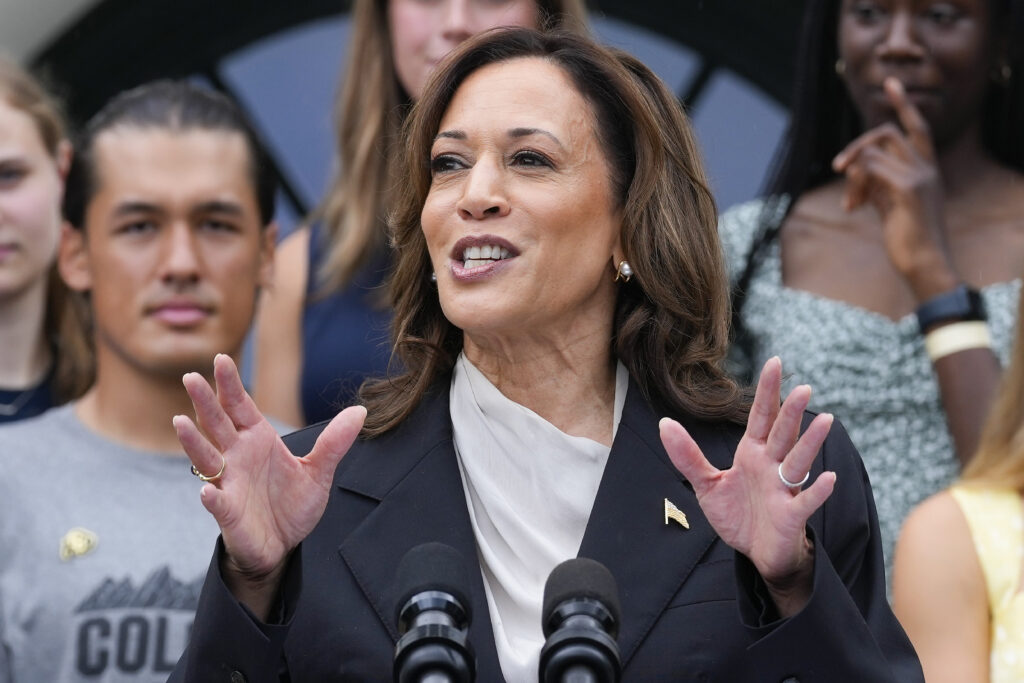Could a Potential President Harris and Justice Kagan Remake the Supreme Court?
The high court jurist suggests that lower court judges could referee the justices under whom they serve.

Justice Elena Kagan appears to be trotting out an argument for a renovation of the Supreme Court — one possibly supported by President Biden and, potentially, a President Harris.
The justice, named to the bench by President Obama in 2010, is a leading light of the Supreme Court’s liberal flank. Her comments, reported by CNN, about changing the high court’s operating systems came at a conference at Sacramento of the United States Court of Appeals for the Ninth Circuit.
Justice Kagan, who once led Harvard Law School and served as America’s solicitor general, ventured her suggestions for reform at a moment when alterations to the court have surfaced as a priority for Mr. Biden’s last months in office. Last week, Mr. Biden indicated that he, like Justice Kagan, supports an enforcement mechanism for the Supreme Court’s ethics code. He also came out in favor of term limits and a constitutional amendment to limit immunity.
The justice just finished a term that saw her pinioned to the minority on such issues as the deference owed administrative agencies, presidential immunity, and the charging of January 6 rioters. Recent years have also seen the justice, whose writing style wins admirers even from ideological foes, on the losing side of cases involving the Second Amendment and abortion.
Justice Kagan has on occasion trained her pen on her ideological compatriots. In Andy Warhol Foundation for the Visual Arts v. Goldsmith, a case that concerned a copyright contretemps that bloomed from the Master’s patented silk screens, she wrote a dissent steeped in art history that would have made John Ruskin blush and likely made Justice Sonia Sotomayor, who wrote the majority opinion, steam. She accused Justice Kagan of “tracing the history of Renaissance painting” rather than writing law.
Speaking to the Ninth Circuit, Justice Kagan lamented the rise of concurring opinions, and the fractal guidance they provide lower court judges. She called that “not a good thing for the court” because it “muddies the waters of our decisions.” It is left to appellate and trial judges to determine what of a Supreme Court ruling is “dictum,” and not binding, and what is law.
A more provocative suggestion concerned not how the justices write decisions but who oversees their behavior. The high court last year, for the first time, adopted a “Code of Conduct,” albeit one without an enforcement mechanism. Now Justice Kagan makes the stunning admission that she thinks that the high court requires referees to enforce that code — and that they should be drawn from lower courts.
Justice Kagan at Sacramento nominated the appellate judges that the high court oversees for the task, because she could not “think of other people who should enforce a code of conduct … against judges. And I think it would be quite bad … for us to do it to each other.” She also called criticism of the court’s unenforceable code “fair” and criticized the “massive shock” and “instability” that flows from the Roberts court’s willingness to overrule precedent.

The jurist added that she supports Chief Justice Roberts appointing a “sort of committee of, you know, highly respected judges with a great deal of experience, with a reputation for fairness, you know, that seems like a good solution to me.” She insists that she speaks only for herself, noting, “This is one person’s view and that’s all it is.”
Justice Kagan could have reckoned that the riders of that tribunal, long a liberal bulwark, would be receptive to her suggestion that the court be reined in by jurists who serve under it. Last week, Mr. Biden indicated that he, like Justice Kagan, supports an enforcement mechanism for the Supreme Court’s ethics code. He also came out in favor of term limits.
Mr. Biden reiterated that lame duck agenda during his Oval Office valedictory, where he promised to “pass the torch” to Ms. Harris. He declared, “I’m going to call for Supreme Court reform because this is critical to our democracy.” During Ms. Harris’s run for president in 2020, she diagnosed a “crisis of confidence” in respect of the court and told Politico, “We have to take this challenge head on, and everything is on the table to do that.”
A more defiant posture toward the court has emerged among Democratic lawmakers. Representative Alexandra Ocasio-Cortez has introduced articles of impeachment against Justices Clarence Thomas and Samuel Alito. She cites the “unchecked corruption crisis on the Supreme Court has now spiraled into a Constitutional crisis threatening American democracy writ large.” Senators Durbin and Whitehouse have sought, without success, to summon Chief Justice Roberts for questioning.
One legal scholar, Joshua Blackman, dissents from Justice Kagan’s drafting of lower court judges to oversee their superiors. He tells the Sun, “There is a reason the Supreme Court justices sit at the top of the pyramid. This proposal would invert that pyramid, and make the Justices subject to the decisions of those whom they review. … This proposal yields more problems than it solves.”
The justice, though, has her champions. The executive director, Gabe Roth, of a group pushing Supreme Court reform, Fix the Court, writes to the Sun that “for any Supreme Court ethics framework to have any teeth, someone must hold the justices to it, and for what should be obvious reasons, it can’t be the justices themselves.” He adds that Justice Kagan’s “vision on this topic should not be dismissed.”
Justice Kagan has offered glimpses of that vision before. Last year, she broke with Supreme Court practice when she cited a statute — one that is not binding on high court justices — to explain her decision to recuse. The standard formula simply states that a justice “took no part in the consideration or decision of this petition.” Chief Justice Roberts has written that recusal is not a position that one justice — or judge — can foist on another.
The Constitution ordains that the “judicial power of the United States, shall be vested in one Supreme Court, and in such inferior courts as the Congress may from time to time ordain and establish,” meaning that only the highest court is mandated. Justice Kagan’s proposal would give judges who owe their office to Congress the power of review over constitutionally mandated jurists.
Article III also dictates that the “judges, both of the supreme and inferior courts, shall hold their offices during good behavior.” It is not immediately clear how that rhymes with Mr. Biden’s support for term limits, though federal judges — not Supreme Court justices — do sometimes take “senior” status, with adjustment in their caseload. There are, though, far more lower court judges than justices, who number only nine — among them Justice Kagan.

